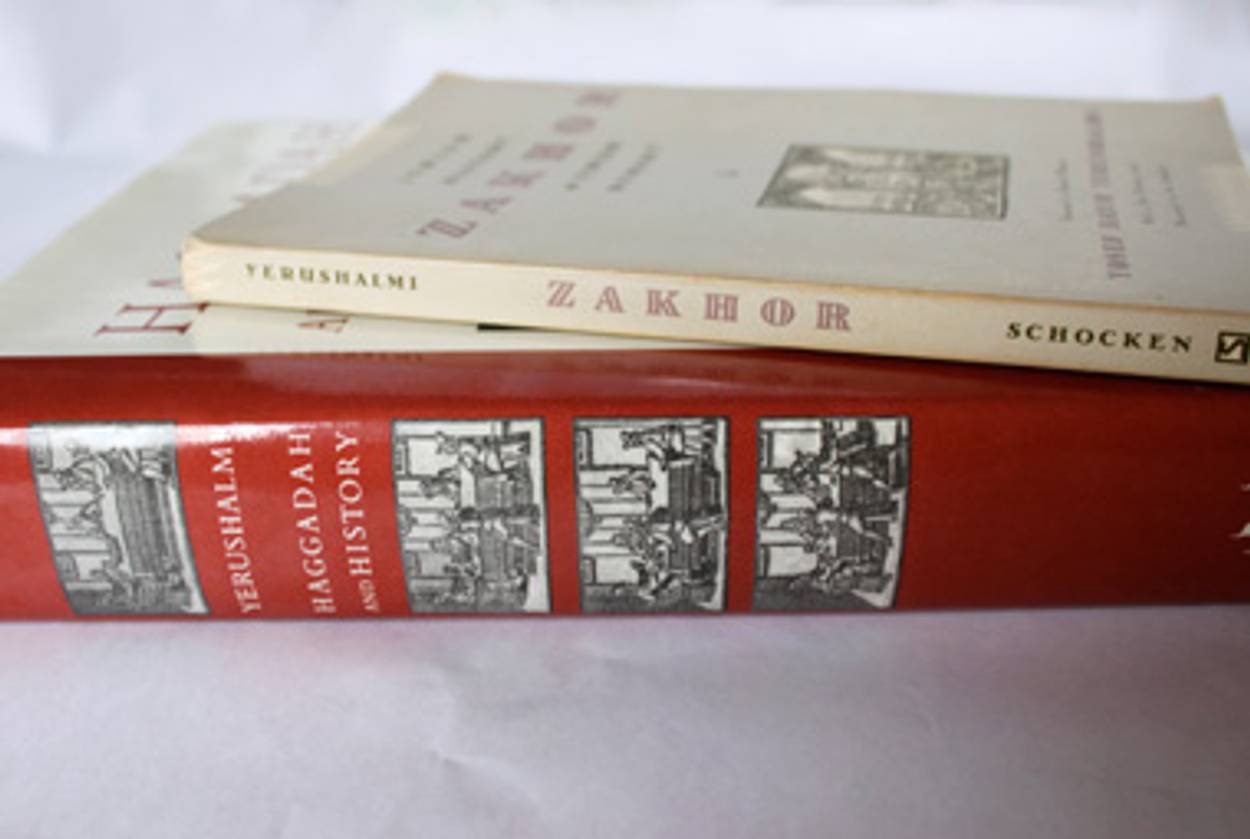History and Memory
Yosef Yerushalmi, who died Tuesday, was a pioneer in the field of Jewish studies




Yosef Hayim Yerushalmi, a leading Jewish historian who mentored a generation of scholars, died Tuesday after a long illness. He was 77.
Within the field of Jewish history, Yerushalmi was first recognized in the early 1970s for his groundbreaking work on the conversos, Jews who converted to Catholicism but kept some Jewish rituals alive in secret after the Spanish Inquisition. But it was his 1982 book, Zakhor: Jewish History and Jewish Memory, that put him on the map for scholars in other fields as well, cementing his reputation as an unusually erudite and wide-ranging thinker who made the concerns of Jewish history universally interesting. His students, whom he taught first at Harvard and then, until his retirement last year, at Columbia, include many of the foremost figures in Jewish studies today.
“He was perhaps the only true humanist I ever met in the field of Jewish studies,” said Leon Wieseltier, the longtime literary editor of The New Republic, and a one-time graduate student of Yerushalmi’s, in an interview. “He was a genuinely cosmopolitan man whose intellectual range in no way compromised the depth and scope of his Jewish learning. He hated the idea that Jewish history would be a provincial or merely ethnic pursuit.”
Zakhor, still Yerushalmi’s best-known book, contrasts the study of history—in which the historian first marshals the facts, then interprets what they mean—with collective memory, in which the meaning of the story precedes and determines the events related. Yerushalmi argued that before the modern era, memory structured the stories Jews told about themselves. A critical moment came in Germany at the beginning of the 19th century, when communal identity and belief began to give way to a secular approach to Jewish life. The historian’s craft, with its focus on collecting and weighing facts, became, Yerushalmi famously wrote, “the faith of fallen Jews.”
This was a critique of Yerushalmi’s own field, and it was both debated and taken up by peers and students as a challenge to think more searchingly about their critical practices. For Yerushalmi’s reputation outside his discipline, meanwhile, the book could not have appeared at a more propitious moment. Scholars in a number of fields, influenced by poststructuralist thought and grappling with the challenges of Holocaust representation, were, first of all, in the midst of their own reconsiderations of historiography. But even more specifically, many of them had also newly become interested in Weimar Jewish thinkers like Walter Benjamin, Franz Rosenzweig, and Gershom Scholem—and Yerushalmi, who had known Scholem personally, fit neatly into this new canon.
As David Myers, once Yerushalmi’s doctoral student and now a professor of Jewish studies at UCLA, explained, the historian’s new admirers read their way back from Zakhor to his earlier work on the medieval and Renaissance Jews of the Iberian peninsula. Despite the relative specialization of the topic, Myers said, these scholars appreciated Yerushalmi’s “exploring the converso as a kind of adumbration of the modern Jew, possessed of multiple and sometimes conflicting identities”—much like Benjamin, Rosenzweig, or Yerushalmi himself.
One of Yerushalmi’s emergent fans during this period was the French philosopher Jacques Derrida, who discussed Zakhor and another influential Yerushalmi work, Freud’s Moses, in his own writing. The two became friends and interlocutors, but their relationship also testified to another aspect of Yerushalmi’s character, Myers said: ego. “In the end, Yerushalmi feared that Derrida the literary critic didn’t fully grasp him, the historian,” he said. “For Yerushalmi, the slightest criticism could dissolve even the most fulsome praise.”
Indeed, both Yerushalmi’s most accomplished former students and his most recent ones describe a brilliant teacher who could be difficult and intimidating but also completely engaged with mentorship. “He’s a very captivating figure, an old-style professor, always wears a suit, always stands up and orates, has kind of a fake British accent,” said David Berman, a recent Columbia graduate who took every class Yerushalmi offered and served as his research assistant, which involved buying packs of cigarettes (Yerushalmi was a heavy smoker) and listening to him muse aloud for hours on end. “He had a bust of [his mentor, the historian] Salo Baron in his office,” Berman said. “Who the hell has busts?”
Born in New York in 1932, Yerushalmi attended yeshiva and grew up in a home where Hebrew, Yiddish, and English were spoken. After receiving a rabbinical ordination from the Jewish Theological Seminary, he studied history at Columbia under Baron. He is survived by his wife, Ophra, and son, Ariel.
Marissa Brostoff, a doctoral student in English at the CUNY Graduate Center, is a former staff writer at Tablet and the Forward.
Ari M. Brostoff is Culture Editor at Jewish Currents.